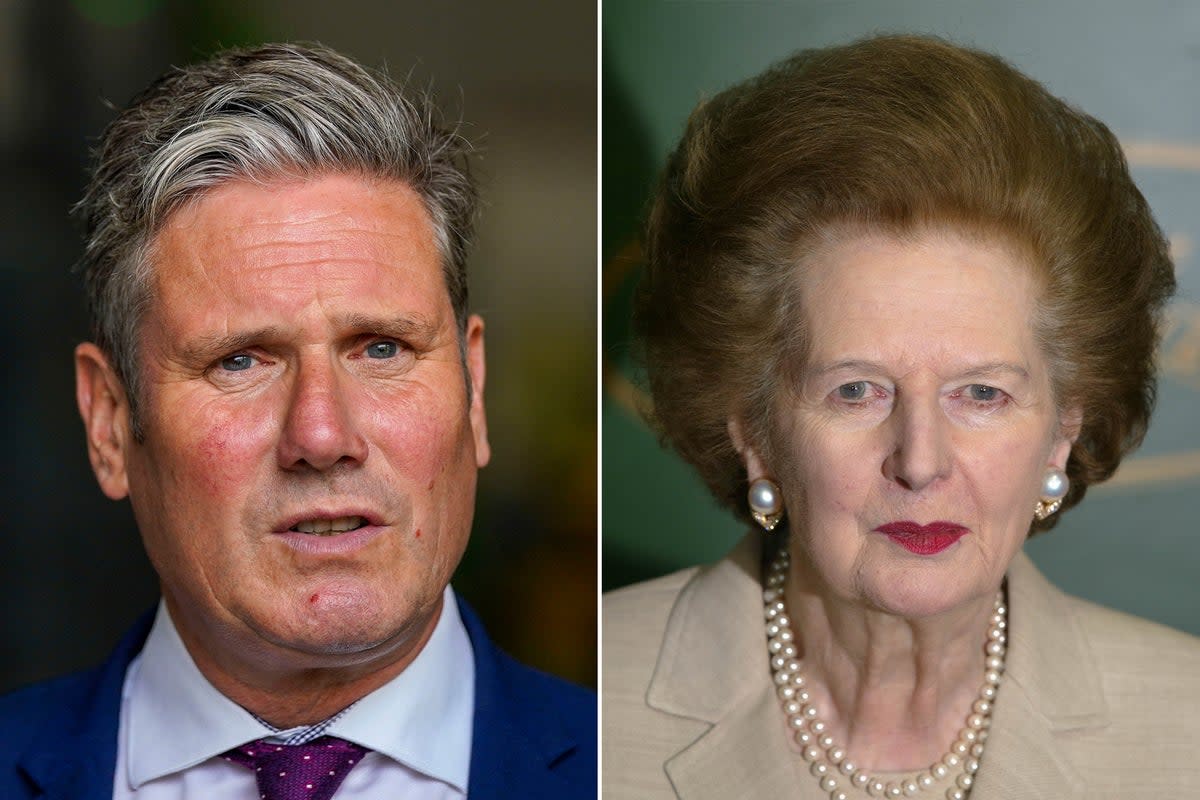Voices: Why Starmer’s praise for Thatcher is so significant

When the leader of the Labour Party is praising Margaret Thatcher, you know UK politics has descended into farce.
Writing in The Daily Telegraph, Starmer said that every moment of “meaningful change” in modern British politics “begins with the realisation that politics must act in service of the British people, rather than dictating to them”. Thatcher sought to “drag Britain out of its stupor by setting loose our natural entrepreneurialism”, he added.
He then makes similar points about Tony Blair and Clement Attlee, so it’s hardly the team switching endorsement that some are accusing him of – but saying anything positive about Thatcher is incredible for reasons that go far beyond her being a Conservative.
To understand just how dramatic – and significant – it is for the leader of the opposition (and main party of progress) to talk up the approach of a strongly divisive Tory politician from 40 years ago, we need to consider how he got his job in the first place.
Starmer became leader of the Labour Party because Jeremy Corbyn experienced the worst election defeat since 1935. The Tories achieved that election defeat over Labour on a “Get Brexit done” manifesto and a promise to level up the forgotten parts of the UK. And it was Thatcher who helped to lay the groundwork for that north-south divide.
How? Well, the UK has the highest levels of regional inequality in the economically advanced world. Economic historian Professor Jim Tomlinson has said the closure of major industries between the 1960s and 1980s, especially in northern England, set the stage for Brexit. While he has noted that deindustrialisation began under the previous Labour government, it is widely understood that Thatcher accelerated the shutdown of coal and steel mining, as well as shipbuilding.
As was explained to me by Steven France, a community organiser in Sunderland: “The Brexit problem can be traced back to a lack of investment from the eighties with Margaret Thatcher.”
What that means is that millions of people watched London get more investment and opportunities every year, while their communities were ignored for generations. The Leave campaign then targeted those areas with the message that our EU membership was part of a regime that only benefited the “liberal metropolitan elite” (ie Londoners).
Fast forward to today... and Starmer is supporting Brexit with slogans like “Make Brexit work” in the hopes of winning back voters who chose Brexit as a rebellion against the regional equality that Thatcher fuelled.
To publicly praise her, even a little bit, is a wild change of strategy. It risks alienating the very kinds of voters he’s been trying to impress by backing Brexit. The suggestion that Thatcher dragged us out of a stupor, and put our entrepreneurial spirit to work, is especially offensive to people whose parents lost their jobs because of the deindustrialisation she oversaw, and her hostility towards striking miners.
Brexit was all a con. The people who offered Brexit as a way to help the poorer parts of the UK never cared about them. As Boris Johnson once said: “A pound spent in Croydon is of far more value to the country ... than a pound spent in Strathclyde.” And, lest we forget: Rishi Sunak spent last summer bragging about defunding deprived urban areas.
We heard Manchester mayor Andy Burnham’s testimony in the Covid inquiry, last week, that the government basically forgot about the north. The north-south divide has only widened in the years since Brexit. And on balance, the north of England now opposes Brexit.
Brexit, as a tool for achieving regional and financial equality, is dead in the eyes of most people. So nothing is stopping Starmer from saying: “I’d spend a large chunk of the £40bn in extra government funds we’d get by rejoining the EU, creating jobs, housing and transport links for working people across the country.”
But, no. Backing Brexit and praising the very politician who deindustrialised the North is the way to go, apparently.
Starmer is so desperate to win over disillusioned Tory voters that he now risks alienating Remain and Leave voters at the same time.

 Yahoo News
Yahoo News 
